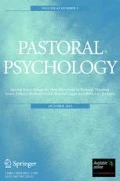Abstract
This paper considers the particular resonances between the experience of obsessive-compulsive disorder (OCD) and a theology of Holy Saturday that emphasizes Christ’s “going to the dead.” On the psychological front, the paper reviews common aspects of OCD; on the theological front, the paper outlines the arguments of Hans Urs von Balthasar concerning Christ’s Holy Saturday suffering and solidarity with humanity. The paper then utilizes a “Chalcedonian conception” of balancing theology and psychology, with each informing (and not eclipsing) the other, by examining the ways that a study of OCD and Holy Saturday together can prevent harmful distinctions between the spiritual and the scientific, the sacred and the secular.
Similar content being viewed by others
Data availability
Not applicable.
Notes
It should be noted that how one would put these ideas into practice with non-Christian counselees is an entirely different, complicated matter—one worthy of its own study.
I am grateful to Adam D. Tietje and Alan E. Lewis for introducing me, through their writing, to this phrase.
Tietje (2018) offers a key example of what can happen when this theology-psychology asymmetry is reversed. He critiques theologian Shelly Rambo’s Spirit and Trauma: A Theology of Remaining, in which “Rambo takes trauma to be the interpretive lens through which to read the Christian story and, in turn, do theology” (p. 58). Her “hermeneutics of trauma” (p. 58) shapes her view of Holy Saturday as a day without the hope of the resurrection: “It is after a complete end and without a new beginning” (p. 59). He sees her argument as being light on the Trinity and heavy on hopelessness—seeing everything through the lens of trauma theory leaves Christ in the grave, merely in solidarity with the human dead. In looking at Rambo’s work through the lens of the Chalcedonian pattern, we see that “to use trauma or trauma theory as a hermeneutical lens for doing theology puts trauma in the place of logical priority and conceptual independence over against theology” (p. 62).
References
American Psychological Association. (2020, April). About APA. https://www.apa.org/about/.
Balthasar, H. U. (2005). Mysterium Paschale: The mystery of Easter (A. Nichols, Trans.). San Francisco: Ignatius Press. (Original work published 1970).
Barth, K. (2010). Church dogmatics, volume IV: The doctrine of reconciliation, part 1 (G. W. Bromiley, Trans.; G. W. Bromiley & T. F. Torrance, Eds.). Peabody: Hendrickson publishers. (Original work published 1955).
Carson, M. (2010). Deep heat and bandages? Historical criticism, bounded indeterminacy, and pastoral care. Evangelical Quarterly, 82(4), 340–352.
Francis. (2015, May 24). Laudato Si’ [Encyclical letter]. http://w2.vatican.va/content/dam/francesco/pdf/encyclicals/documents/papa-francesco_20150524_enciclica-laudato-si_en.pdf.
Hunsinger, D. D. (1995). Theology and pastoral counseling: A new interdisciplinary approach. Grand Rapids: Wm. B. Eerdmans.
Hyman, B. M., & DuFrene, T. (2008). Coping with OCD: Practical strategies for living well with obsessive-compulsive disorder. Oakland: New Harbinger.
Lewis, A. E. (2001). Between cross and resurrection: A theology of holy Saturday. Grand Rapids: Wm. B. Eerdmans.
Nichols, A. (2005). Introduction. In H. U. Balthasar, Mysterium Paschale: The mystery of Easter (A. Nichols, Trans.). San Francisco: Ignatius Press.
Swinton, J. (2014, October 6). Doing small things with extraordinary love: Congregational care of people experiencing mental health problems. ABC. https://www.abc.net.au/religion/doing-small-things-with-extraordinary-love-congregational-care-o/10098938.
Tietje, A. D. (2018). Toward a pastoral theology of holy Saturday: Providing spiritual care for war wounded souls. Eugene: Wipf & Stock.
VandenBos, G. R. (Ed.). (2007). APA dictionary of psychology. Washington: American Psychological Association.
Williams, R. (2004). Balthasar and the trinity. In E. T. Oakes & D. Moss (Eds.), The Cambridge companion to Hans Urs von Balthasar (pp. 37–50). Cambridge: Cambridge University Press.
Yarhouse, M. A., Butman, R. E., & McRay, B. W. (2005). The modern psychopathologies: A comprehensive Christian appraisal. Westmont: InterVarsity Press.
Acknowledgments
I am grateful to my faculty advisor at Duke, Dr. Jeremy Begbie, for his guidance in shaping the scope of this paper.
Author information
Authors and Affiliations
Contributions
Not applicable.
Corresponding author
Ethics declarations
Conflicts of interest/competing interests
Not applicable.
Code availability
Not applicable.
Additional information
Publisher’s Note
Springer Nature remains neutral with regard to jurisdictional claims in published maps and institutional affiliations.
Rights and permissions
About this article
Cite this article
Lund, E. Holy Saturday and the Experience of Obsessive-Compulsive Disorder: a Chalcedonian Approach. Pastoral Psychol 70, 71–85 (2021). https://doi.org/10.1007/s11089-020-00936-z
Accepted:
Published:
Issue Date:
DOI: https://doi.org/10.1007/s11089-020-00936-z




